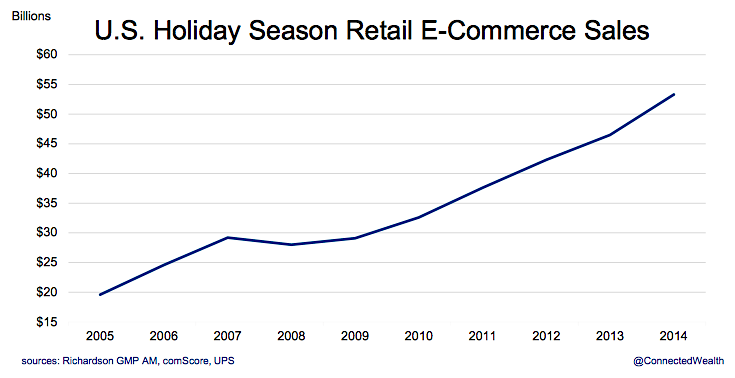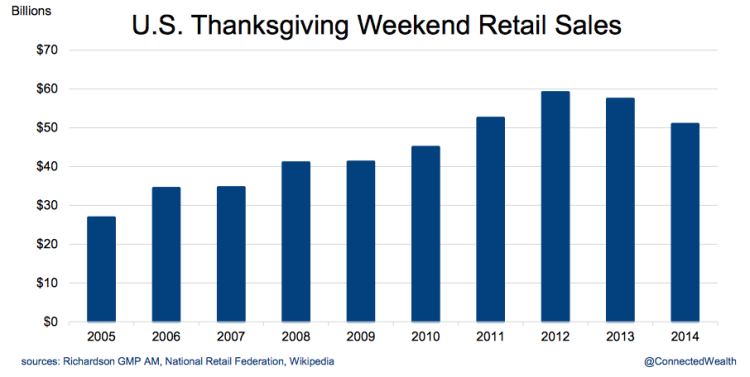Over the coming days, the business news headlines will not speak of the Federal Reserve, commodity prices or currencies. Instead they will likely focus on early mornings, insane consumers and possibly altercations that will emerge from the chaos of Black Friday as shoppers fight for that last Star Wars figurine or Princess Anna or Elsa doll from the movie Frozen.
That’s right, Black Friday returns in the United States which typically starts the holiday shopping season when retailers go from red (unprofitable) to black (profitable) for the year. Or does it?
The way we shop has changed dramatically with the introduction of online shopping and particularly in the last decade as the ability of corporations to understand our spending habits and communicate with us has grown immensely. With this increased power of information and communication, two trends clearly stand out that have reduced the effectiveness of the Black Friday in-store sales.
The first and most obvious trend is the simplicity and convenience of online sales.
When we witness the chaos of Black Friday every year it only serves as a reminder of the comfort of shopping from home. Now that retailers have poured all kinds of investment into their online shopping platforms, shoppers don’t have to set foot inside a store to check everyone off their Christmas shopping list. Since 2005, the dollar amount of U.S. holiday season retail online sales have risen 270%. The rate of growth also shows no sign of slowing down. The nine-year average growth rate in holiday online shopping is 12%, yet 2014 saw a 14.6% jump in online holiday shopping.
Is Black Friday still relevant? Yes, but….
The second trend is the desire of retailers to start holiday shopping earlier than Black Friday. Progressively, over time, holiday sales have been pushed earlier into November which has essentially resulted with the holiday shopping season now starting the day after Halloween on November 1. While sales prior to Black Friday may not have the dramatic discounts Americans normally see after a Thanksgiving turkey dinner, they can still bring forward sales from the Thanksgiving weekend.
These two trends are not new at all and the expectation has been that they would eventually have an impact on Black Friday weekend sales. Based on the accompanying chart, it would appear this impact is finally being felt as Black Friday weekend in-store sales have actually declined over the past two years. While last year’s sales fell to just north of US$50 billion, we can’t dismiss the importance of Black Friday altogether as total holiday retail sales last year were estimated at about US$90 billion. In other words, Americans are still using the Thanksgiving weekend to get the majority of their Christmas shopping completed. So instead of focusing on Black Friday sales alone, total holidays sales will likely be more important going forward due to the two trends mentioned previously as the timing of sales doesn’t matter as much as the sales actually happening in the first place.
And for those of you wondering about Cyber Monday and whether it will steal all the attention from Black Friday in the near future, we would argue that it won’t for two reasons: 1) Last year Cyber Monday sales in the United States were about US$2 billion which pales in comparison to the US$50 billion over the Thanksgiving weekend and 2) thanks to the internet and the desire to push sales closer to Halloween, every day could technically be Cyber Monday if retailers really wanted it to be.
continue reading on the next page…










